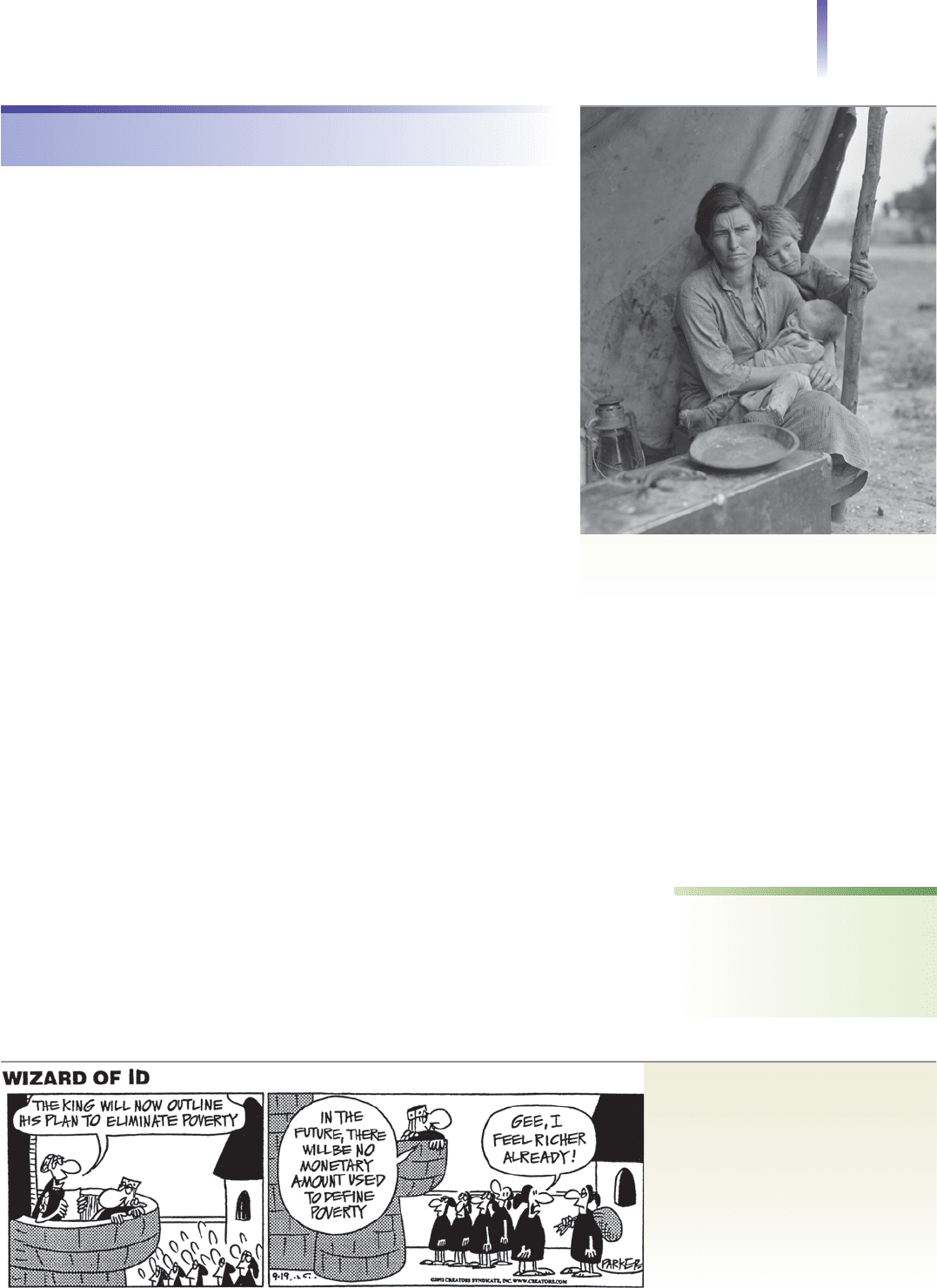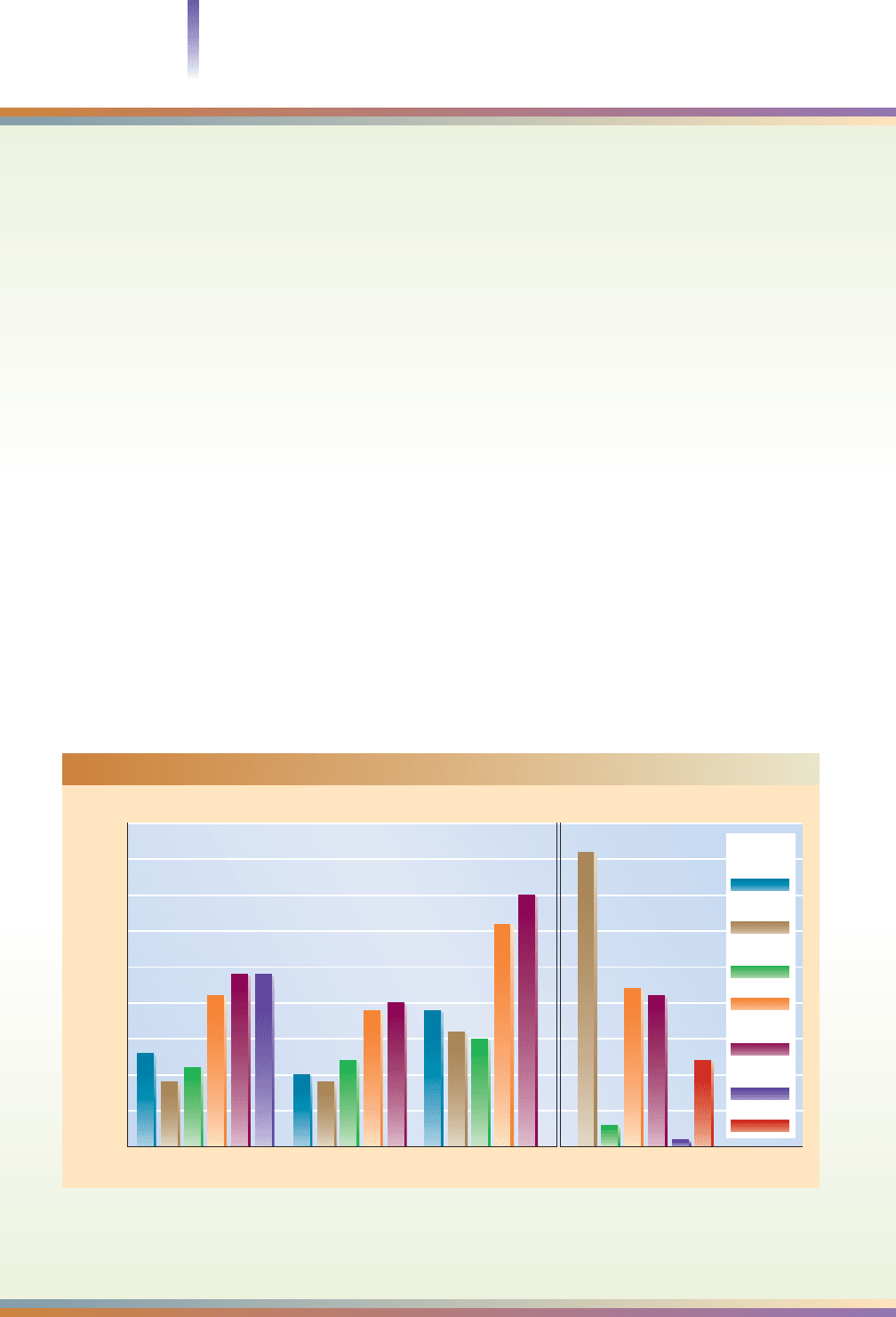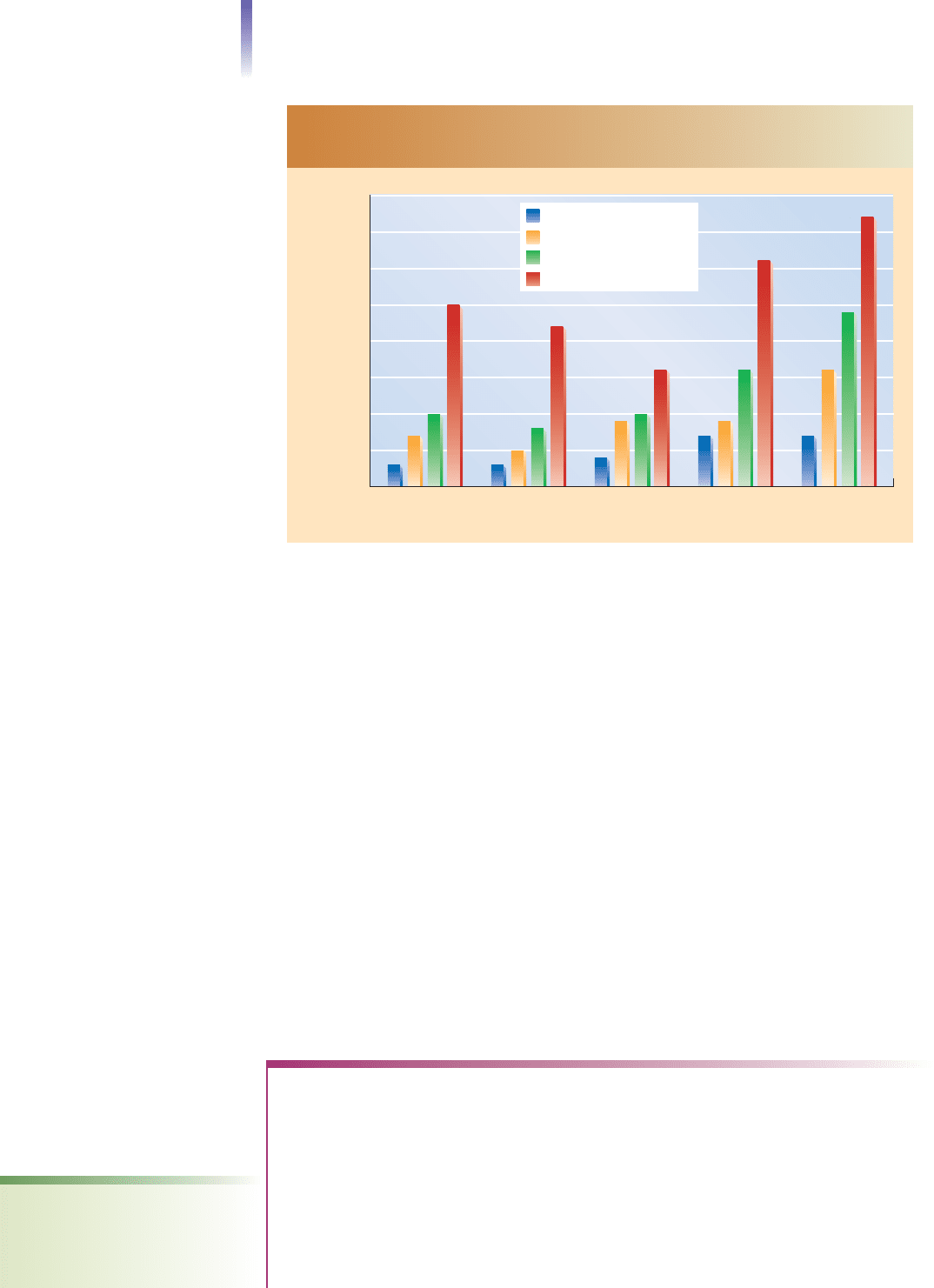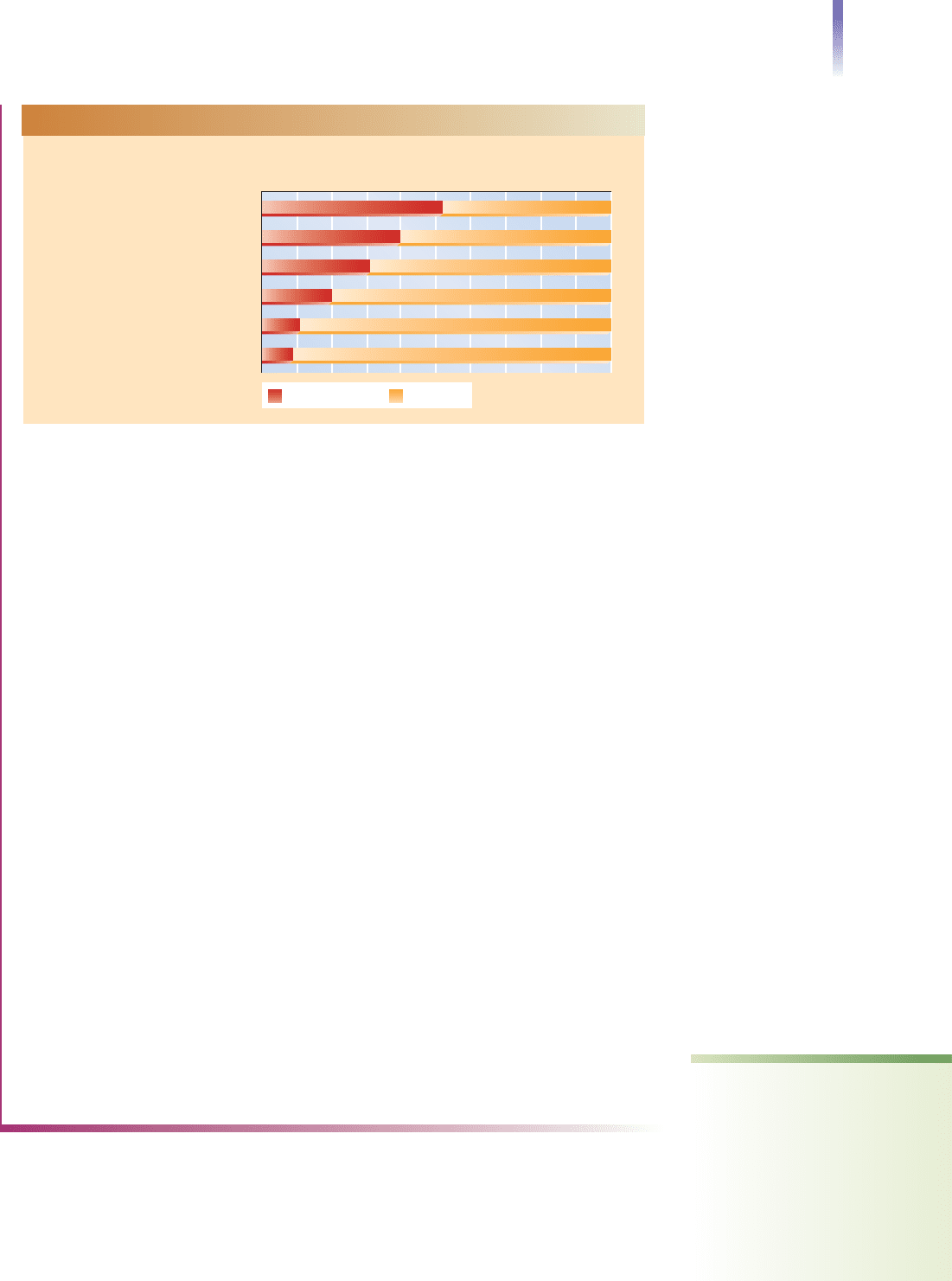Henslin James M. Sociology: A Down to Earth Approach
Подождите немного. Документ загружается.


Pover ty
Many Americans find that the “limitless possibilities” of the American dream
are quite elusive. As illustrated in Figure 10.5 on page 271, the working poor
and underclass together form about one-fifth of the U.S. population. This
translates into a huge number, about 60 million people. Who are these people?
Drawing the Poverty Line
To determine who is poor, the U.S. government draws a poverty line. This
measure was set in the 1960s, when poor people were thought to spend about
one-third of their incomes on food. On the basis of this assumption, each year
the government computes a low-cost food budget and multiplies it by 3. Fam-
ilies whose incomes are less than this amount are classified as poor; those whose
incomes are higher—even by a dollar—are determined to be “not poor.”
This official measure of poverty is grossly inadequate. Poor people actually
spend only about 20 percent of their incomes on food, so to determine a poverty
line, we ought to multiply their food budget by 5 instead of 3 (Uchitelle 2001).
Another problem is that mothers who work outside the home and have to pay
for child care are treated the same as mothers who don’t have this expense. The
poverty line is also the same for everyone across the nation, even though the cost
of living is much higher in New York than in Alabama. In addition, much of
the income of the poor goes uncounted: food stamps, rent assistance, subsi-
dized child care, and the earned income tax credit (Kaufman 2007).
That a change in the poverty line would instantly make millions of people
poor—or take away their poverty—would be laughable, if it weren’t so serious.
(The absurdity has not been lost on Parker and Hart, as you can see from their cartoon below).
Although this line is arbitrary, because it is the official measure of poverty, we’ll use it to see
who in the United States is poor. Before we do this, though, compare your ideas of the poor
with the stereotypes explored in the Down-to-Earth Sociology box on the next page.
Who Are the Poor?
Geography. As you can see from the Social Map on page 283, the poor are not distrib-
uted evenly among the states. Notice the clustering of poverty in the South, a pattern that
has prevailed for more than 150 years.
A second aspect of geography is also significant. The rate of rural poverty (16 percent)
is higher than the national average of 12 percent. What is different about rural poverty?
The rural poor are less likely to be single parents and more likely to be married and to
have jobs. Compared with urban Americans, the rural poor are less educated, and the
jobs available to them pay less than similar jobs in urban areas (Lichter and Crowley
2002; Arsneault 2006).
Geography, however, is not the main factor in poverty. The greatest predictors of
poverty are race–ethnicity, education, and the sex of the person who heads the family.
Let’s look at these factors.
Poverty 281
poverty line the official
measure of poverty; calculated
to include incomes that are
less than three times a low-
cost food budget
This cartoon pinpoints the
arbitrary nature of the poverty
line.This almost makes me think
that the creators of the Wizard
of Id have been studying
sociology.
High rates of rural poverty have been a part of
the United States from its origin to the present.
This 1937 photo shows a 32-year old woman in
California who had seven children and no food.

282 Chapter 10 SOCIAL CLASS IN THE UNITED STATES
Taking Another Fun Quiz: Exploring
Stereotypes About the Poor
D
o you hold any of these stereotypes? Can you tell
which are true and which are not?
Most poor people are lazy. They are poor be-
cause they do not want to work. False. Half of
the poor are either too old or too young to work:
About 40 percent are under age 18, and another 10
percent are age 65 or older.About 30 percent of the
working-age poor work at least half the year.
Most of the poor are trapped in a cycle of poverty
that few escape. False. Long-term poverty is the ex-
ception. Most poverty lasts less than a year (Lichter
and Crowley 2002). Only 12 percent remain in
poverty for five or more consecutive years (O’Hare
1996a). Most children who are born in poverty are not
poor as adults (Ruggles 1989; Corcoran 2001).
There is more poverty in rural than in urban
areas. True.We’ll review this in the following section.
Most African Americans are poor. False.This one
was easy. We just reviewed some statistics in the
box on upward mobility on page 280—plus you
have the bar chart below.
Most of the poor are African Americans. False. Look
at the second part of Figure 10.6. There are more poor
whites than any other group. The combined total of poor
African Americans, Latinos, and Native Americans, how-
ever, is larger than the total of poor whites.
Most of the poor are single mothers and their
children. False.About 38 percent of the poor match
this stereotype, but 34 percent of the poor live in
married-couple families, 22 percent live alone or with
nonrelatives, and 6 percent live in other settings.
Most of the poor live in the inner city. False.
About 42 percent of the poor do live in the inner
city, but 36 percent live in the suburbs, and 22 per-
cent live in small towns and rural areas.
Most of the poor live on welfare. False. Only about
25 percent of the income of poor adults comes from
welfare.About half comes from wages and pensions,
and about 22 percent from Social Security.
On a percentage basis, more children than adults
are poor. True. (Okay, no one holds this stereotype. I
just want to make this important point.We’ll come
back to it shortly.)
For Your Consideration
What stereotypes of the poor do you (or people you
know) hold? How would you test these stereotypes?
Sources: O’Hare 1996a, 1996b, with other sources as indicated.
Down-to-Earth Sociology
0%
5%
10%
15%
20%
25%
30%
35%
40%
Part 2 Of all the U.S. poor, what
percentages are from these groups?
Part 1 Of these groups,
what percentage is poor?
Percentage
45%
Overall
13
9
21
24
24
1
11
12
2
41
22
21
1
3
The elderly
age 65 and over
10
9
19
20
12
Children
under age 18
19
16
31
35
15
All racial–
ethnic
groups
White
Americans
Asian
Americans
Latinos
African
Americans
Native
Americans
Others
FIGURE 10.6 Race–Ethnicity and U.S. Poverty
1
The source does not break this total down by age.
2
Others consists of people who identify themselves as being of
ancestry other than the groups listed here plus those who claim membership in two or more racial–ethnic groups.
Note: Only these groups are listed in the source.The poverty line on which this figure is based is $20,614 for a family of four.
Source: By the author. Based on Statistical Abstract of the United States 2011:Tables 36, 709, and 712.

Race–Ethnicity. One of the strongest factors in poverty is race–ethnicity. As Figure
10.6 shows, only 10 percent of Asian Americans and whites are poor. In contrast, 21
percent of Latinos live in poverty, while the total jumps even higher, to 24 percent for
African Americans and 27 percent for Native Americans. Because whites are, by far, the
largest group in the United States, their much lower rate of poverty still translates into
larger numbers. As a result, there are more poor whites than poor people of any other
racial–ethnic group.
Education. You are aware that education is a vital factor in poverty, but you may not
know just how powerful it is. Figure 10.8 on the
next page shows that 3 of 100 people who finish
college end up in poverty, but 1 of every 4 people
who drop out of high school is poor. As you can
see, the chances that someone will be poor be-
come less with each higher level of education. Al-
though this principle applies regardless of
race–ethnicity, this figure shows that at every level
of education, race–ethnicity makes an impact.
The Feminization of Poverty. One of the best
indicators of whether or not a family is poor is
family structure. Families headed by both a
mother and father are the least likely to be poor,
and families headed by only a mother are the
most likely to be poor (Statistical Abstract
2011:Table 691). The reason for this can be
summed up in this one statistic: Women average
only 70 percent of what men earn. (If you want
to jump ahead, go to Figure 11.8 on page 318.)
Poverty 283
AK
VT
Percentage of the
population in poverty
UT
OH
SC
NC
VA
WA
OR
CA
NV
ID
MT
WY
AZ
NM
CO
ND
SD
NE
KS
OK
TX
MN
IA
MO
AR
LA
WI
IL
KY
TN
MS
AL
GA
FL
IN
MI
WV
PA
NY
ME
NH
MA
RI
CT
NJ
DE
MD
DC
HI
States with the least poverty: 7.6% to 10.8%
States with average poverty: 11.3% to 13.6%
States with the most poverty: 14.4% to 21.2%
FIGURE 10.7 Patterns of Poverty
Note: Poverty varies tremendously from one state to another. In the extreme, poverty is about
three times greater in Mississippi (21.2%) than in New Hampshire (7.6%).
Source: By the author. Based on Statistical Abstract of the United States 2011:Table 708.
Beyond the awareness of most Americans are the rural poor, such as this family
in Maine.With low education and few good jobs available, life is hardscrabble.
What do you think the future holds for these children?

With our high rate of divorce combined with our high number of births to single women,
mother-headed families have become more common. Sociologists call this association of
poverty with women the feminization of poverty.
Old Age. As Figure 10.6 on page 282 shows, the elderly are less likely than the gen-
eral population to be poor. This is quite a change. It used to be that growing old in-
creased people’s chances of being poor, but government policies to redistribute
income—Social Security and subsidized housing, food stamps, and medical care—
slashed the rate of poverty among the elderly. Figure 10.6 also shows how the prevail-
ing racial–ethnic patterns carry over into old age. You can see how much more likely
an elderly African American, Latino, or Native American is to be poor than an elderly
white or Asian American.
Children of Poverty
Children are more likely to live in poverty than are adults or the elderly. This holds true
regardless of race–ethnicity, but from Figure 10.6 on page 282, you can see how much
greater poverty is among Latino, African American, and Native American children. That
millions of U.S. children are reared in poverty is shocking when one considers the wealth
of this country and the supposed concern for the well-being of children. This tragic as-
pect of poverty is the topic of the following Thinking Critically section.
ThinkingCRITICALLY
The Nation’s Shame: Children in Poverty
O
ne of the most startling statistics in sociology is shown in Figure 10.6 on page 282.
Look at the rate of childhood poverty: For Asian Americans, 1 of 8 children is
poor; for whites, 1 of 7; for Latinos, 1 of 4; and for African Americans, an astound-
ing 1 of 3. These percentages translate into incredible numbers—approximately 13 million
children.
284 Chapter 10 SOCIAL CLASS IN THE UNITED STATES
[the] feminization of
poverty refers to the situa-
tion that most poor families in
the U.S. are headed by women
0
5%
10%
15%
20%
25%
30%
35%
40%
Percentage in Poverty
All Racial-Ethnic
Groups
White
Americans
Asian
Americans
Latinos
African
Americans
College graduate
College dropout
High school graduate
High school dropout
7
10
25
3
5
8
22
3
9
10
16
4
9
16
31
7
16
24
37
7
FIGURE 10.8 Who Ends Up Poor? Poverty by Education
and Race–Ethnicity
Source: By the author. Based on Statistical Abstract of the United States 2007:Table 694.

Why do so many U.S. children live in poverty? A major reason is the large number of
births to women who are not married, about 1.5 million a year. This number has increased
sharply. In 1960, 1 of 20 U.S. children was born to a single woman. Today that total is about
eight times higher, and single women now account for 2 of 5 (40 percent) of all U.S. births
(Statistical Abstract 2011:Tables 80, 86).
By itself, though, births to single women don’t cause poverty. Consider the obvious: Chil-
dren born to wealthy single women aren’t reared in poverty.Then consider this:Although
the U.S. birth rate to single women is not the highest in the industrialized world, our rate of
child poverty is the highest in the industrialized world (Rainwater and Smeeding 2003). In coun-
tries where the birth rate to single women is higher than ours but where child poverty is
lower, the government provides extensive support for rearing these children—from day
care to health checkups and medicine. As the cause of their poverty, then, why can’t we
point to government support for children—or the lack of it?
Apart from the matter of government policy, births to single women follow patterns that
have a negative impact on their children’s welfare.The less education a single woman has,
the more likely she is to bear children. As you can see from Figure 10.9, births to single
women drop with each gain in education.As you know, people with lower education earn
less, so this means that the single women who can least afford children are those most
likely to give birth. Their children are likely to face the obstacles to building a satisfying life
that poverty entails.They are more likely to die in infancy, to go hungry, to be malnourished,
to develop more slowly, and to have more health problems. They also are more likely to
drop out of school, to become involved in criminal activities, and to have children while still
in their teens—thus perpetuating a cycle of poverty.
For Your Consideration
With education so important to obtain jobs that pay well, in light of Figure 10.9, what pro-
grams would you suggest for helping women attain more education? What programs would
you suggest for reducing child poverty? Be specific and practical.
The Dynamics of Poverty
Some have suggested that the poor get trapped in a culture of poverty (Lewis 1966a;
Gorsky 2008). They assume that the values and behaviors of the poor “make them fun-
damentally different from other Americans, and that these factors are largely responsible
for their continued long-term poverty” (Ruggles 1989:7).
Poverty 285
Not a high school graduate
High school graduate
Some college, no degree
Associate’s degree
Bachelor’s degree
Graduate or professional degree
%0010 80%60%40%20%
Unmarried Married
Of women with this education who give birth, what percentages are single and married?
FIGURE 10.9 Births to Single Mothers
Note: Based on a national sample of all U.S. births in the preceding 12 months.
Source: Dye 2005.
culture of poverty the as-
sumption that the values and
behaviors of the poor make
them fundamentally different
from other people, that these
factors are largely responsible
for their poverty, and that par-
ents perpetuate poverty across
generations by passing these
characteristics to their children

Lurking behind this concept is the idea that the poor are lazy people who bring poverty
on themselves. Certainly, some individuals and families match this stereotype—many of
us have known them. But is a self-perpetuating culture—one that poor people transmit
across generations and that locks them in poverty—the basic reason for U.S. poverty?
Researchers who began following 5,000 poor U.S. families in 1968 uncovered some
surprising findings. Contrary to stereotypes, most poverty is short-lived, lasting only a
year or less. Most poverty comes about because of a dramatic life change such as divorce,
the loss of a job, or even the birth of a child (O’Hare 1996a). As Figure 10.10 shows,
only 12 percent of poverty lasts five years or longer. Contrary to the stereotype of lazy peo-
ple content to live off the government, few poor people enjoy poverty—and they do what
they can to avoid being poor.
Yet from one year to the next, the number of poor people remains about the same.
This means that the people who move out of poverty are replaced by people who move
into poverty. Most of these newly poor will also move out of poverty within a year. Some
people even bounce back and forth, never quite making it securely out of poverty. Poverty,
then, is dynamic, touching a lot more people than the official totals indicate. Although
13 percent of Americans may be poor at any one time, twice that number—about one-
fourth of the U.S. population—is or has been poor for at least a year.
Why Are People Poor?
Two explanations for poverty compete for our attention. The first, which sociologists pre-
fer, focuses on social structure. Sociologists stress that features of society deny some people
access to education or the learning of job skills. They emphasize racial–ethnic, age, and
gender discrimination, as well as changes in the job market—the closing of plants, the
elimination of unskilled jobs, and the increase in marginal jobs that pay poverty wages.
In short, some people find their escape route from poverty to a better life blocked.
A competing explanation focuses on the characteristics of individuals that are assumed
to contribute to poverty. Sociologists reject individualistic explanations such as laziness and
lack of intelligence, viewing these as worthless stereotypes. Individualistic explanations
that sociologists reluctantly acknowledge include dropping out of school, bearing children
in the teen years, and averaging more children than women in the other social classes.
Most sociologists are reluctant to speak of such factors in this context, for they appear to
blame the victim, something that sociologists bend over backward not to do.
The tension between these competing explanations is of more than just theoretical in-
terest. Each explanation affects our perception and has practical consequences, as is illus-
trated in the following Thinking Critically section.
ThinkingCRITICALLY
The Welfare Debate: The Deserving and the
Undeserving Poor
T
hroughout U.S. history,Americans have divided the poor into two types: the deserving
and the undeserving. The deserving poor are people who, in the public mind, are poor
through no fault of their own. Most of the working poor, such as the Lewises, are con-
sidered deserving:
Nancy and Ted Lewis are in their early 30s and have two children.Ted works three
part-time jobs, earning $13,000 a year; Nancy takes care of the children and house
and is not employed. To make ends meet, the Lewises rely on food stamps, Medicaid,
and housing subsidies.
The undeserving poor, in contrast, are viewed as people who brought on their own
poverty. They are freeloaders who waste their lives in laziness, alcohol and drug abuse, and
286 Chapter 10 SOCIAL CLASS IN THE UNITED STATES
17%
8%
5%
59%
12%
One year or less
2 years
Up to 3 years
Five
years
or
more
Up to
4 years
FIGURE 10.10 How
Long Does Poverty Last?
Source: Gottschalk et al. 1994:89.

promiscuous sex. They don’t deserve help, and, if given anything, will waste it on their dis-
solute lifestyles. Some would see Joan as an example:
Joan, her mother, and her two brothers and two sisters lived on welfare. Joan started
having sex at 13, bore her first child at 15, and, now, at 23, is expecting her fourth
child. Her first two children have the same father, the third a different father, and Joan
isn’t sure who fathered her coming child. Joan parties most nights, using both alcohol
and whatever drugs are available. Her house is filthy, the refrigerator usually empty,
and social workers have threatened to take away her children.
This division of the poor into deserving and undeserving underlies the heated debate
about welfare.“Why should we use our hard-earned money to help them? They are just
going to waste it. Of course, there are others who want to get back on their feet, and help-
ing them is okay.”
For Your Consideration
Why do people make a distinction between deserving and undeserving poor? Should we let
some people starve because they “brought poverty upon themselves”? Should we let chil-
dren go hungry because their parents are drug abusers? Does “unworthy” mean that we
should not offer assistance to people who “squander” the help they are given?
In contrast to thinking of poor people as deserving or undeserving, use the sociological
perspective to explain poverty without blaming the victim. What social conditions (condi-
tions of society) create poverty? Are there social conditions that produce the lifestyles that
the middle class so despises?
Welfare Reform
After decades of criticism, the U.S. welfare system was restructured in 1996. A federal
law—the Personal Responsibility and Work Opportunity Reconciliation Act—requires
states to place a lifetime cap on welfare assistance and compels welfare recipients to look
for work and to take available jobs. The maximum length of time that someone can col-
lect welfare is five years. In some states, it is less. Unmarried teen parents must attend
school and live at home or in some other adult-supervised setting.
This law set off a storm of criticism. Some called it an attack on the poor. Defenders
replied that the new rules would rescue people from poverty. They would transform wel-
fare recipients into self-supporting and hard-working citizens—and reduce welfare costs.
National welfare rolls plummeted, dropping by about 60 percent (Urban Institute 2006).
Two out of five who left welfare also moved out of poverty (Hofferth 2002).
This is only the rosy part of the picture, however. Three of five are still in poverty or
are back on welfare. A third of those who were forced off welfare have no jobs (Hage
2004; Urban Institute 2006). Some can’t work because they have health problems. Oth-
ers lack transportation. Some are addicted to drugs and alcohol. Still others are trapped
in economically depressed communities where there are no jobs. Then there are those
who have jobs, but earn so little that they remain in poverty. Consider one of the “suc-
cess stories”:
JoAnne Sims, 37, lives in Erie, New York, with her 7-year-old daughter Jamine. JoAnne left
welfare, and now earns $7.25 an hour as a cook for Head Start. Her 37-hour week brings
$268 before deductions. With the help of medical benefits and a mother who provides child
care, JoAnne “gets by.” She says, “From what I hear, a lot of us who went off welfare are still
poor . . . let me tell you, it’s not easy.” (Peterson 2000; earnings updated)
Conflict theorists have an interesting interpretation of welfare. They say that the pur-
pose of welfare is not to help people, but, rather, to maintain a reserve labor force. It is de-
signed to keep the unemployed alive during economic downturns until their labor is needed
during the next economic boom. The 1996 law that reduced the welfare rolls fits this
Poverty 287

model, as it was passed during the longest economic boom in U.S. history. Recessions are
inevitable, however, and just as inevitable is surging unemployment. In line with conflict
theory, we can predict that during the coming recession, welfare rules will be softened—
in order to keep the reserve labor force ready for the next time they are needed.
Deferred Gratification
One consequence of a life of deprivation punctuated by emergencies—and of viewing the
future as promising more of the same—is a lack of deferred gratification, giving up things
in the present for the sake of greater gains in the future. It is difficult to practice this middle-
class virtue if one does not have a middle-class surplus—or middle-class hope.
In a classic1967 study of black streetcorner men, sociologist Elliot Liebow noted that the
men did not defer gratification. Their jobs were low-paying and insecure, their lives pitted
with emergencies. With the future looking exactly like the present, and any savings they
did manage gobbled up by emergencies, it seemed pointless to save for the future. The only
thing that made sense from their perspective was to enjoy what they could at that moment.
Immediate gratification, then, was not the cause of their poverty, but, rather, its conse-
quence. Cause and consequence loop together, however, for their immediate gratification
helped perpetuate their poverty. For another look at this “looping,” see the Down-to-Earth
Sociology box on the next page, in which I share my personal experiences with poverty.
If both causes are at work, why do sociologists emphasize the structural explanation?
Reverse the situation for a moment. Suppose that members of the middle class drove old
cars that broke down, faced threats from the utility company to shut off the electricity and
heat, and had to make a choice between paying the rent or buying medicine and food and
diapers. How long would they practice deferred gratification? Their orientations to life
would likely make a sharp U-turn.
Sociologists, then, do not view the behaviors of the poor as the cause of their poverty,
but, rather, as the result of their poverty. Poor people would welcome the middle-class op-
portunities that would allow them the chance to practice the middle-class virtue of de-
ferred gratification. Without those opportunities, though, they just can’t afford it.
Where Is Horatio Alger? The Social Functions of a Myth
In the late 1800s, Horatio Alger was one of the country’s most popular authors. The
rags-to-riches exploits of his fictional boy heroes and their amazing successes in over-
coming severe odds motivated thousands of boys of that period. Although Alger’s char-
acters have disappeared from U.S. literature, they remain alive and well in the psyche of
Americans. From real-life examples of people of humble origin who climbed the social
class ladder, Americans know that anyone who really tries can get ahead. In fact, they be-
lieve that most Americans, including minorities and the working poor, have an average
or better-than-average chance of getting ahead—obviously a statistical impossibility
(Kluegel and Smith 1986).
The accuracy of the Horatio Alger myth is less important than the belief that limit-
less possibilities exist for everyone. Functionalists would stress that this belief is functional
for society. On the one hand, it encourages people to compete for higher positions, or, as
the song says, “to reach for the highest star.” On the other hand, it places blame for fail-
ure squarely on the individual. If you don’t make it—in the face of ample opportunities
to get ahead—the fault must be your own. The Horatio Alger myth helps to stabilize so-
ciety: Since the fault is viewed as the individual’s, not society’s, current social arrange-
ments can be regarded as satisfactory. This reduces pressures to change the system.
As Marx and Weber pointed out, social class penetrates our consciousness, shaping our
ideas of life and our “proper” place in society. When the rich look at the world around
them, they sense superiority and anticipate control over their own destiny. When the poor
look around them, they are more likely to sense defeat and to anticipate that unpredictable
forces will batter their lives. Both rich and poor know the dominant ideology, that their
particular niche in life is due to their own efforts, that the reasons for success—or failure—
lie solely with the self. Like fish that don’t notice the water, people tend not to perceive
the effects of social class on their own lives.
288 Chapter 10 SOCIAL CLASS IN THE UNITED STATES
deferred gratification doing
without something in the pres-
ent in the hope of achieving
greater gains in the future
Horatio Alger myth the be-
lief that due to limitless possi-
bilities anyone can get ahead if
he or she tries hard enough
A society’s dominant ideologies
are reinforced throughout the
society, including its literature.
Horatio Alger provided
inspirational heroes for thousands
of boys. The central theme of
these many novels, immensely
popular in their time, was rags
to riches. Through rugged
determination and self-sacrifice, a
boy could overcome seemingly
insurmountable obstacles to
reach the pinnacle of success.
(Girls did not strive for financial
success, but were dependent on
fathers and husbands.)

Poverty 289
Poverty: A Personal Journey
I
was born in poverty. My parents, who could not af-
ford to rent a house or apartment, rented the tiny
office in their minister’s house.That is where I was
born.
My father began to slowly climb the social class lad-
der. His fitful odyssey took him from laborer to truck
driver to the owner of a series of small businesses (tire
repair shop, bar, hotel), then to vacuum cleaner sales-
man, and back to bar owner. He converted a garage into
a house. Although it had no indoor plumbing or insula-
tion (in northern Minnesota!), it was a start. Later, he
bought a house, and then he built a new home. After
that we moved into a trailer, and then back to a house.
My father’s seventh-grade education was always an ob-
stacle. Although he never became wealthy, poverty
eventually became a distant memory for him.
My social class took a leap—from working class to
upper middle class—when, after attending college and
graduate school, I became a university professor. I en-
tered a world that was unknown to my parents, one
that was much more pampered and privileged. I had op-
portunities to do research, to publish, and to travel to
exotic places. My reading centered on sociological re-
search, and I read books in Spanish as well as in English.
My father, in contrast, never read a book in his life, and
my mother read only detective stories and romance pa-
perbacks. One set of experiences isn’t “better” than the
other, just significantly different in determining what
windows of perception it opens onto the world.
My interest in poverty, which was rooted in my own
childhood experiences, stayed with me. I traveled to a
dozen or so skid rows across the United States and
Canada, talking to homeless people and staying in their
shelters. In my own town, I spent considerable time
with people on welfare, observing how they lived. I con-
stantly marveled at the connections between structural
causes of poverty (low education and skills, undepend-
able transportation, the lack of unskilled jobs) and
personal causes (the culture of poverty—alcohol and drug
abuse, multiple out-of-wedlock births, frivolous spend-
ing, all-night partying, and a seeming incapacity to keep
appointments—except to pick up the welfare check).
Sociologists haven’t unraveled this connection, and as
much as we might like for only structural causes to
apply, clearly both are at work (Duneier 1999:122). The
situation can be illustrated by looking at the perennial
health problems I observed among the poor—the con-
stant colds, runny noses, backaches, and injuries.The
health problems stem from the social structure (less ac-
cess to medical care, less capable physicians, drafty
houses, little knowledge about nutrition, and more dan-
gerous jobs). At the same time, personal characteristics—
hygiene, eating habits, and overdrinking—cause health
problems.Which is the cause and which the effect?
Both, of course, for one loops into the other.The med-
ical problems (which are based on both personal and
structural causes) feed into the poverty these people
experience, making them less able to perform their jobs
successfully—or even to show up at work regularly.
What an intricate puzzle for sociologists!
Down-to-Earth Sociology
By the Numbers: Then and Now
Frequency of births
outside of marriage
1960
in
NOW
in
The poorest 20% of
Americans receive this
percentage of the
nation’s income
1970
6
NOW
3
%%
The richest 20% of
Americans receive this
percentage of the
nation’s income
1970
41
NOW
51
%%

290 Chapter 10 SOCIAL CLASS IN THE UNITED STATES
SUMMARY and REVIEW
What Is Social Class?
What is meant by the term social class?
Most sociologists have adopted Weber’s definition of
social class: a large group of people who rank closely to
one another in terms of property (wealth), power, and
prestige. Wealth—consisting of the value of property
and income—is concentrated in the upper classes. From
the 1930s to the 1970s, the trend in the distribution of
wealth in the United States was toward greater equality.
Since that time, it has been toward greater inequality.
Pp. 262–265.
Power is the ability to get one’s way even though oth-
ers resist. C. Wright Mills coined the term power elite to
refer to the small group that holds the reins of power in
business, government, and the military. Prestige is linked
to occupational status. People’s rankings of occupational
prestige have changed little over the decades and are sim-
ilar from country to country. Globally, the occupations
that bring greater prestige are those that pay more, require
more education and abstract thought, and offer greater
independence. Pp. 266–267.
What is meant by the term status inconsistency?
Status is social position. Most people are status consis-
tent; that is, they rank high or low on all three dimen-
sions of social class. People who rank higher on some
dimensions than on others are status inconsistent. The
frustrations of status inconsistency tend to produce po-
litical radicalism. Pp. 268–269.
Sociological Models of Social Class
What models are used to portray the social classes?
Erik Wright developed a four-class model based on Marx:
(1) capitalists (owners of large businesses), (2) petty
bourgeoisie (small business owners), (3) managers, and
(4) workers. Kahl and Gilbert developed a six-class model
based on Weber. At the top is the capitalist class. In
descending order are the upper middle class, the lower
middle class, the working class, the working poor, and the
underclass. Pp. 270–273.
Consequences of Social Class
How does social class affect people’s lives?
Social class leaves no aspect of life untouched. It affects
our chances of benefiting from the new technology, dying
early, becoming ill, receiving good health care, and get-
ting divorced. Social class membership also affects child
rearing, educational attainment, religious affiliation, polit-
ical participation, the crimes people commit, and contact
with the criminal justice system. Pp. 273–277.
Social Mobility
What are three types of social mobility?
The term intergenerational mobility refers to changes
in social class from one generation to the next. Structural
mobility refers to changes in society that lead large num-
bers of people to change their social class. Exchange mo-
bility is the movement of large numbers of people from
one class to another, with the net result that the relative
proportions of the population in the classes remain about
the same. Pp. 277–280.
Poverty
Who are the poor?
Poverty is unequally distributed in the United States.
Racial–ethnic minorities (except Asian Americans), children,
households headed by women, and rural Americans are more
likely than others to be poor. The poverty rate of the elderly
is less than that of the general population. Pp. 281–286.
Why are people poor?
Some social analysts believe that characteristics of individuals
cause poverty. Sociologists, in contrast, examine structural
features of society, such as employment opportunities, to
find the causes of poverty. Sociologists generally conclude
that life orientations are a consequence, not the cause, of
people’s position in the social class structure. Pp. 286–289.
How is the Horatio Alger myth functional for society?
The Horatio Alger myth—the belief that anyone can get
ahead if only he or she tries hard enough—encourages
people to strive to get ahead. It also deflects blame for fail-
ure from society to the individual. P. 288.
THINKING CRITICALLY ABOUT Chapter 10
1. The belief that the United States is the land of opportunity
draws millions of legal and illegal immigrants to the United
States each year. How do the materials in this chapter sup-
port or undermine this belief?
2. How does social class impact your life?
3. What social mobility has your own family experienced?
In what ways has this affected your life?
